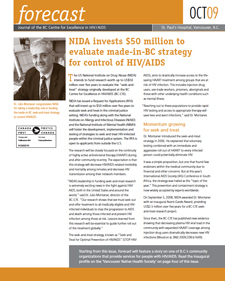NIDA invests $50 million to evaluate made-in-BC strategy for control of HIV/AIDS
The US National Institute on Drug Abuse (NIDA) intends to fund research worth up to US$50 million over five years to evaluate the “seek-and-treat” strategy originally developed at the BC Centre for Excellence in HIV/AIDS (BC-CfE).
NIDA has issued a Request for Applications (RFA) that will invest up to $50 million over five years to evaluate seek and treat in the criminal justice setting. NIDA’s funding along with the National Institute on Allergy and Infectious Diseases (NIAID) and the National Institute of Mental Health (NIMH) will foster the development, implementation and testing of strategies to seek and treat HIV-infected people within the criminal justice system. The RFA is open to applicants from outside the U.S.
The research will be closely focused on the continuity of highly active antiretroviral therapy (HAART) during and after community re-entry. The expectation is that this strategy will decrease HIV/AIDS-related morbidity and mortality among inmates and decrease HIV transmission among their network members.
“NIDA’s leadership in funding seek-and-treat research is extremely exciting news in the fight against HIV/AIDS, both in the United States and around the world,” said Dr. Julio Montaner, director of the BC-CfE. “Our research shows that we must seek out and offer treatment to all medically eligible and HIV-infected individuals to stop the progression to AIDS and death among those infected and prevent HIV infection among those at risk. Lessons learned from this research will be essential to guide further roll out of the treatment globally.”
The seek-and-treat strategy, known as “Seek and Treat for Optimal Prevention of HIV/AIDS” (STOP HIV/AIDS), aims to drastically increase access to the lifesaving HAART treatment among groups that are at risk of HIV infection. This includes injection drug users, sex-trade workers, prisoners, aboriginals and those with other underlying health conditions such as mental illness.
“Reaching out to these populations to provide rapid HIV testing and access to appropriate therapy will save lives and avert infections,” said Dr. Montaner.
Momentum growing for seek and treat
Dr. Montaner introduced the seek-and-treat strategy in 2006. He explained that voluntary testing combined with an immediate and aggressive roll out of HAART to every infected person could potentially eliminate HIV.
It was a simple proposition, but one that found few endorsers within the medical community due to financial and other concerns. But at this year’s International AIDS Society (IAS) Conference in South Africa, the strategy was hailed as the “topic of the year.” This prevention and containment strategy is now widely accepted by experts worldwide.
On September 5, 2008, NIDA awarded Dr. Montaner with an inaugural Avant-Garde Award, providing US$2.5 million over five years for a BC-CfE seek-and-treat research project.
Since then, the BC-CfE has published new evidence showing that decreasing plasma HIV viral load in the community with expanded HAART coverage among injection drug users dramatically decreases new HIV infections (Wood et al, BMJ 2009;338:b1649).

